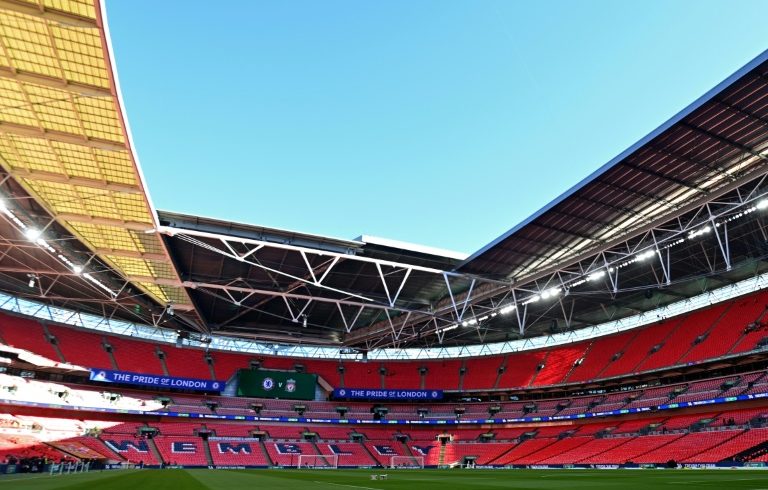
Wembley stadium looks set to host the Euro 2028 final (JUSTIN TALLIS)
England, Northern Ireland, the Republic of Ireland, Scotland and Wales will play host to Euro 2028, UEFA confirmed on Tuesday.
AFP Sport looks at the 10 proposed venues that will host the 51 matches involving 24 nations:
Wembley (London, capacity 90,000)
Host for the semi-finals and final of the last European Championship in 2021, Wembley is set to again be the destination for the closing stages of the tournament.
Despite crowd trouble as England were beaten on penalties by Italy at Euro 2020, the home of English football has long been a favoured venue by UEFA thanks to a huge capacity, corporate facilities and London location.
Tottenham Hotspur Stadium (London, capacity 62,850)
Widely regarded as one of the world’s leading stadiums, Spurs’ home since 2019 has played host to major concerts, boxing, rugby and NFL events as well as football.
Etihad Stadium (Manchester, capacity 53,400)
Home of Premier League champions Manchester City, the selection of the Etihad over Manchester United’s Old Trafford, which enjoys a 20,000 greater capacity, has raised eyebrows.
However, while United’s owners have faced criticism for allowing Old Trafford to decay, City are planning further redevelopment of the site they took over following the Commonwealth Games in 2002.
The Etihad’s capacity will be expanded to over 60,000 in the next three years along with the construction of a 400-bed hotel, museum and 3,000 capacity fan zone.
Villa Park (Birmingham, capacity 42,640)
The home of Aston Villa hosted matches the last time England fully hosted a major tournament at Euro 96.
Once a regular venue for FA Cup semi-finals thanks to its Midlands location in Birmingham, Villa Park has fallen behind the times in part due to the club’s three-year spell out of the Premier League between 2016 and 2019.
But the good times are back on the field with Villa back in Europe and plans for a £100 million ($122 million) investment in the stadium to bring capacity up to 50,000 by 2028.
St. James’ Park (Newcastle, capacity 52,000)
Newcastle is just getting used to European nights again with the Magpies back in the Champions League for the first time in 20 years and now some of the continent’s best national teams will be turning up in the north-east of England.
Backed by the Saudi sovereign wealth fund, Newcastle are also looking at stadium expansion that could take the capacity of St. James’ to 65,000.
Bramley Moore Dock (Liverpool, capacity 53,000)
The one English stadium in the bid yet to open, Everton’s new home on the Merseyside docks is due to be completed in 2024.
Inclusion in the bid was a major coup for the Toffees ahead of Liverpool’s Anfield, which is only two miles away.
Hampden Park (Glasgow, capacity 52,000)
Scottish football’s spiritual home, Glasgow’s Hampden Park has twice played host to European Cup finals.
It also hosted four games at Euro 2020 but with crowds limited to just 12,000 due to coronavirus restrictions.
Principality Stadium (Cardiff, capacity 74,500)
Set in Cardiff’s city centre, the Principality, former known as the Millenium Stadium, has hosted a series of major football and rugby events for the past 24 years.
The Football Association of Wales has already indicated their hope Cardiff will host the opening match of the tournament.
Aviva Stadium (Dublin, capacity 51,700)
The Aviva missed out two years ago as a planned series of games at Euro 2020 were scrapped due to more severe Covid regulations in Ireland.
Host of next year’s Europa League final, it is set to host six matches at Euro 2028, including a quarter-final.
Casement Park (Belfast, capacity 34,000)
The one great unknown of the bid is whether a multi-million pound redevelopment of the currently derelict site in west Belfast will finally get the go-ahead.
Northern Ireland’s habitual home Windsor Park does not meet the minimum 30,000 capacity.
Casement has normally been reserved for use of the Antrim Gaelic games club and it remains to be solved how the bill for a more than £100 million investment will be divided up between the Gaelic Athletic Association, government and football authorities.
kca/nr






